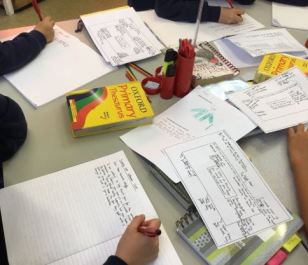This is an example of an approach to a text, which is designed specifically to help all pupils to develop their writing of literary narrative without recourse to the ‘features of descriptive writing’ or to checklists of literary devices. Over a series of sessions, it integrates whole-class reading practice with the planning and drafting of a piece of extended writing.
_________________________
We often talk about the importance of pupils ‘reading as writers, and writing as readers’. It’s a powerful idea which doesn’t translate simply into a list of practices, but which is more about the culture of the classroom: the way pupils are encouraged always to think about their reading and their writing as in dialogue with each other; the way they are encouraged to develop a certain sense of control when they are reading and when they are writing. Continue reading “Reading as writers; writing as readers: an account of a Year 5/6 teaching sequence”


 Some thoughts on task-setting and assessment in English, especially at Key Stage 3
Some thoughts on task-setting and assessment in English, especially at Key Stage 3
 Number #1 in an occasional series of
Number #1 in an occasional series of 